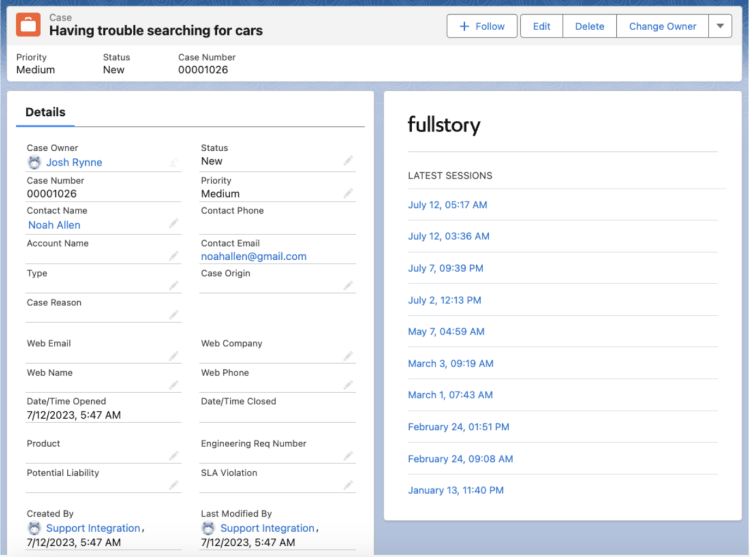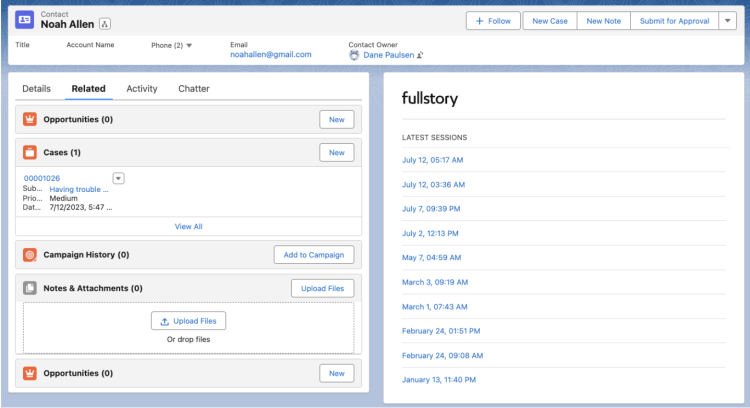Amplify your customer support and account management efforts with the FullStory + Salesforce integration
As the world's largest CRM platform, Salesforce is a powerful tool for tens of thousands of companies, assisting everything from customer relationship management to sales, account management, customer success, and more—and "more" now includes extending Salesforce with deep customer insights provided by FullStory search and session replay.
Here's what the integration can do for you:
Connect Salesforce Service Cloud to FullStory and never have to ask for a screenshot again. FullStory session replay gives you the context your customer support professionals need to solve customer tickets quickly and effectively.
Connect Salesforce Sales Cloud to FullStory and understand your customer's experience with your product, what features they are using (or not!), and what questions or concerns they have as well as what questions or concerns they may not have voiced.
Any object—starting with Cases, Leads, and Contacts—can be tied to FullStory sessions.
Everything can be done while maintaining privacy. Configure this integration to use an anonymous User ID so that only the necessary data is passed on to FullStory.
If you're ready, jump right to our Knowledge Base article and get going. The integration uses the Salesforce AppExchange. Our listing is here and FullStory is "Lightning ready," and it takes just a few steps to get started.
Or, if you're curious to know more about how FullStory extends Salesforce's customer success and customer support efforts, read on.
FullStory + Salesforce Service Cloud
The problem: Getting the context you need to solve support tickets
As a support pro, your job is to support customers with as few touches as possible. The challenge is that support tickets can be vague and unclear—customers struggle to explain what isn't working, or what broke on your site or with your product.
"Could you take a screenshot?"
"Could you walk me through what you were doing?"
These common support questions have been nearly unavoidable and result in complex, hard to understand answers. They can quickly make a bad customer experience worse.
FullStory removes the problem of understanding context around a support ticket. With FullStory, you just replay the customer's session, watch what they did, and understand exactly what they saw that led to them filing a ticket.
Here’s how the FullStory Lightning Component appears on the Case page in Salesforce. Get a full list of customer sessions to investigate exactly what problem they were experiencing.
The details: How Salesforce Service Cloud + FullStory works
With the Salesforce Service Cloud integration with FullStory, you never need to ask for a screenshot again. Customer problems automatically have the most recent FullStory sessions captured for the user alongside the case. Your support professionals can review customer sessions for the much-needed context around a customer's problem.
The result is fewer touches, greater clarity, faster resolution, and improved customer support metrics.
Plus: happier customers and healthier bottom lines.
FullStory + Salesforce Sales Cloud
The problem: Understand the customer's current experience with your product
Imagine you're managing a relationship with a newly created customer. How is their experience with your product going? What parts of the product have they tried? Where are they struggling? What are they missing?
Traditionally, the only way to know the answers to these questions is to ask the customer directly. This process can be tedious for the customer who struggles to articulate the features, fails to remember their specific interactions, and doesn't have time to waste helping you do your job.
Salesforce data can also be pushed back into FullStory as custom user properties. This is useful for building segments, metrics, funnels, and more based on certain user attributes that only live in your CRM (Salesforce). This helps users like sales managers and support managers to see trends, overall patterns of user behavior, and more.
With FullStory's integration, you can see just what the customer has been doing across all their online sessions, giving you the context you need when you talk to them about how well—or not so well—their experience is going.
The details: How Salesforce Sales Cloud + FullStory works
FullStory captures all of your customer's sessions online so that you can watch recreations of their experiences, and by watching these video-like replays, you can determine how they have been using your product, what features they have tried (or not), and what questions they might have.
How to get started with the integration
The Salesforce + FullStory integration uses Salesforce AppExchange and there are a handful of steps you'll need to go through to get fully set up with FullStory for Service Cloud and Sales Cloud. Open up our Knowledge Base article to get started.
The end result is that you can use the FullStory Lightning Component in Salesforce on any record page. Use the included configuration for Cases, Contacts, or Leads pages, or add your own configuration for other objects. Wherever the FullStory component is present, you'll get a list of sessions that correspond to the customer in question.
Privacy matters
Your users care about privacy, and so do you. Users entrust you with their personal data, and you don’t want to share that data with other systems unnecessarily. The Salesforce + FullStory integration can be configured to fetch user sessions using an anonymous user ID, rather than a user’s email address. No need to send email addresses or any other personal information into FullStory.
Now go and drive customer success with Salesforce and FullStory.






